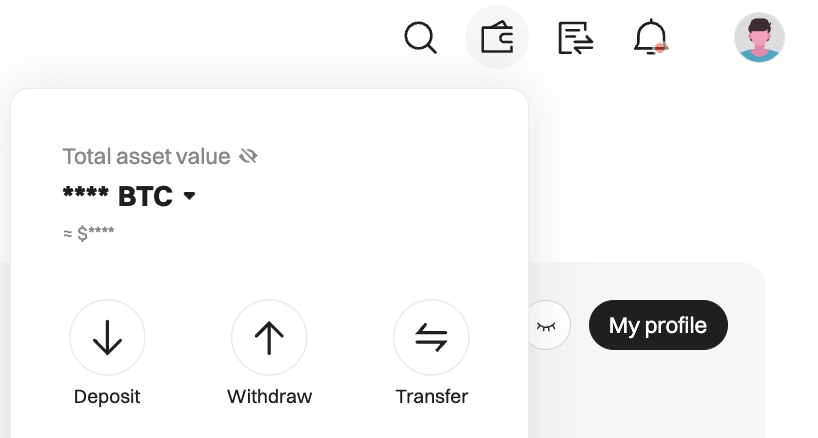
How to buy Bitcoin (BTC) in Djibouti
Simple 3-step guide to buying BTC today in Djibouti
Step 1: Create a free account on the Bitget website or the app
Step 2: Place an order for Bitcoin using a payment method of your choice:
Buy Bitcoin with a debit/credit card
For Visa or Mastercard, select Credit/Debit card, then click Add New Card under the "Buy" tab Credit/Debit in the Buy Crypto tab of the Bitget app
Credit/Debit in the Buy Crypto tab of the Bitget app Credit/Debit in the Buy Crypto tab of the Bitget websiteSelect your preferred fiat currency, enter the amount you wish to spend, link your credit card, and then complete your payment with zero fees.
Credit/Debit in the Buy Crypto tab of the Bitget websiteSelect your preferred fiat currency, enter the amount you wish to spend, link your credit card, and then complete your payment with zero fees. Add a new card to complete your payment on the Bitget app
Add a new card to complete your payment on the Bitget app Enter your bank card details to complete your payment on the Bitget websiteFor Diners Club/Discover card, click Buy Crypto > [Third Party] in the top navigation bar to place your Bitcoin order.
Enter your bank card details to complete your payment on the Bitget websiteFor Diners Club/Discover card, click Buy Crypto > [Third Party] in the top navigation bar to place your Bitcoin order. How to buy crypto with credit/debit card
How to buy crypto with credit/debit cardBuy Bitcoin with Google Pay or Apple Pay
Converting your Google Pay and Apple Pay balance into Bitcoin is easy and secure on Bitget. Simply click Buy Crypto > [Third Party] in the top navigation bar to place your Bitcoin order. How to buy crypto via third-party gateway
How to buy crypto via third-party gatewayBuy with bank transfer
We accept various payment methods, including iDeal and SEPA for EUR, PIX for BRL, PayID for AUD, UPI for INR, QRIS, DANA, and OVO for IDR, SPEI for MXN, and GCash for PHP. These services are facilitated by Alchemy Pay, Banxa, Mercuryo, and Simplex payment gateways. Simply select Buy Crypto > [Third Party] in the top navigation bar and select a fiat currency to place your Bitcoin order.Buy Bitcoin with the fiat balance in your Bitget account
You can Deposit fiat funds using Advcash, SEPA, Faster Payments, or PIX payment gateways to top up your Bitget fiat balance. Then, click Buy Crypto > [Cash conversion] in the top navigation bar to place your Bitcoin order.P2P trading
With Bitget P2P, you can buy crypto using over 100 payment methods, including bank transfers, cash, and e-wallets like Payeer, Zelle, Perfect Money, Advcash, and Wise. Simply place an order, pay the seller, and receive your crypto. Enjoy secure transactions with escrow protection. How to buy crypto on Bitget P2P
How to buy crypto on Bitget P2P
Step 3: Monitor Bitcoin in your Bitget spot wallet

Latest Bitcoin news
View moreBuy Bitcoin
Bitget—where the world trades Bitcoin






FAQ
How can I buy Bitcoin on Bitget?
Can I buy just $1 worth of Bitcoin?
What payment options does Bitget support for Bitcoin purchases?
Where can I find the best platform to buy Bitcoin?
Is now a good time to invest in Bitcoin?
What fees should I expect when purchasing Bitcoin?
What is the minimum BTC required to start investing in Bitget?
How many Bitcoins are still available to mine?
What is Bitcoin's share of the global money supply?
What should I do if I encounter issues while buying Bitcoin?
Buy Bitcoin in a different country
Recently added coins
Explore other crypto guidesDjibouti, located on the Horn of Africa, is a territory of dry shrublands, volcanic landforms, and beaches along the Gulf of Aden. Its primary languages are French and Arabic. The Djiboutian franc is the official currency of Dijinouti is Djiboutian franc (DJF), and the country has a population of 1,020,765 as of the year 2022. Using the P2P platform and other crypto deposits, you can buy Bitcoin(BTC) and other cryptocurrencies on Bitget.
The Bitget website and app are available in both French and Arabic, which are the two official languages of Djibouti.
Wherever you are in Djibouti, you may use the Bitget platform to begin your cryptocurrency trading journey. The country of Djibouti is home to numerous stunning cities, such as Ali Sabieh, Tadjourah, and Obock.
The Goda and Mabla Mountains in Djibouti are protected from the hot and dry environment of the rest of the nation. Around 90% of Djibouti's territory is desert, and the nation is home to a variety of coral and fish species. The low-lying Lake Assal in the Danakil Desert is one of the world's saltiest bodies of water.
The 27th of June is Djibouti's Independence Day. In Djibouti, we commemorate the country's proclamation of independence from France in 1977 by having a national holiday. Lake Assal, Day Forest National Park, Lake Abbe, Khor Ambado Beach, Arta Beach, Hamoudi Mosque, and Place Menelik are just a few of the stunning sites in Djibouti. The top cryptocurrency exchange in Djibouti is Bitget.